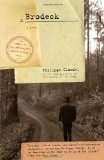Book Club Discussion Questions
In a book club? Subscribe to our Book Club Newsletter!
For supplemental discussion material see our Beyond the Book article, Kristallnacht - a precursor to the holocaust and our BookBrowse Review of Brodeck.
Please be aware that this discussion guide will contain spoilers!
- The novel is set in an unidentified place and time. Why do you think the author chose to make the setting anonymous? Do you think he had a specific historical event in mind? Was this device effective or not? Can you think of another novel in which this is done?
- The first lines of the novel are, "I'm Brodeck and I had nothing to do with it. I insist on that. I want everyone to know." How do you interpret Brodeck's tone? Why is he so adamant about this point? Is it true that he's innocent?
- Brodeck takes it upon himself to assign names to the significant events in his life. Kazerskwir, or "the crater," refers to his two years in the death camp and the Ereigniës, or "the thing that happened," refers to the murder at Schloss's Inn. In your opinion, why does Brodeck name these events? Are these names fitting?
- Brodeck's experience in the prison camp is revealed at intervals throughout the novel, rather than all at once. Why do you think the author chose to develop the story this way?
- Father Peiper tells Brodeck, "Fear is what governs the world." How is this evidenced in the novel? Do you think this is true?
- The novel frequently touches on the contrast between remembering vs. burying the past. Which characters or scenes exemplify this theme? Do you believe that a society can learn from past mistakes? What does the novel seem to say about the merit of a historical record?
- Were you surprised by Diodemus's letter? How did you feel about Brodeck's admission that he doesn't feel hatred toward him? Do you think Diodemus' action is forgivable? Why do you think Brodeck doesn't turn over the letter to see the names of the other villagers who sent him away?
- Do you agree with the Anderer when he tells Brodeck, "talking is the best medicine"? Does talking about one's problems have any negative effects?
- Why do you think the villagers murdered the Anderer? Why do you think they chose Brodeck to write the report?
- In Brodeck's last flashback he tells what happened on the train ride to the prison camp. Why does he save this scene for the end of the story? Did this event change the way you felt about him? Can you think of another time in the book when Brodeck acted cruelly?
- Why does Brodeck decide to leave the village? Is his departure cowardly, brave, or neither?
Unless otherwise stated, this discussion guide is reprinted with the permission of Anchor Books.
Any page references refer to a USA edition of the book, usually the trade paperback version, and may vary in other editions.
